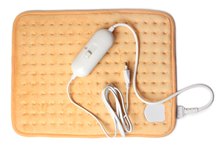What does fact checked mean?
At Healthfully, we strive to deliver objective content that is accurate and up-to-date. Our team periodically reviews articles in order to ensure content quality. The sources cited below consist of evidence from peer-reviewed journals, prominent medical organizations, academic associations, and government data.
The information contained on this site is for informational purposes only, and should not be used as a substitute for the advice of a professional health care provider. Please check with the appropriate physician regarding health questions and concerns. Although we strive to deliver accurate and up-to-date information, no guarantee to that effect is made.
How to Sleep With Occipital Neuralgia
Occipital neuralgia is a severe type of headache that causes symptoms such as piercing or throbbing pain in the upper neck, the back of the head and behind the ears. Some people who suffer from this disorder will also have pain in the forehead and behind the eyes and will experience light sensitivity as well. Occipital neuralgia can be brought on by trauma, compression of the spinal column, blood vessel inflammation, tumors and even localized infections. The pain brought on by this condition can make it difficult to sleep, but there are some things you can do to ease the discomfort and get a good night's rest.
If you are experiencing serious medical symptoms, seek emergency treatment immediately.
Treating the pain symptoms caused by occipital neuralgia is the best way to ensure a good night sleep because it's usually the symptoms that keep you awake. Oral medications may be prescribed by your physician to alleviate the pain. Over-the-counter medications are also available that will decrease inflammation and spasms, which, in turn, reduces pain.
How to Relieve Sciatic Pain in the Pelvic & Hip Joints
Learn More
Applying heat is another way to relieve the symptoms of occipital neuralgia that can often keep you awake at night. Heat aids in reducing inflammation. You can use heating pads, heat wraps, warm gel packs and even moist washclothes heated in the microwave.
Adjusting the position you sleep in can also help reduce the pain associated with occipital neuralgia, as sometimes these headaches are caused by a pinched occipital nerve. Never sleep in a crooked position because this can cause your head and neck muscles to become stiff and to contract, which can apply pressure to the nerve. Try sleeping with a pillow that supports your neck but that does not allow your head to be higher than your neck.
Related Articles
References
- Cesmebasi A, Muhleman MA, Hulsberg P, et al. Occipital neuralgia: Anatomic considerations. Clinical Anatomy. 2014;28(1):101-108. doi:10.1002/ca.22468.
- Dougherty C. Occipital Neuralgia. Current Pain and Headache Reports. 2014;18(5). doi:10.1007/s11916-014-0411-x
- American Association of Neurological Surgeons. Occipital Neuralgia.
- American Migraine Foundation. Occipital Neuralgia.
- Bender. SD. Occipital nerve block for cervicogenic headaches. Practical Pain Management.
- Choi, II and Je, SR. Neuralgias of the head: Occipital neuralgia. J Korean Med Sci. 2016 Apr; 31(4): 479–488.
- Johns Hopkins Medicine. Occipital Neuralgia.
- Kaushal, K Ghosh, S and Donan, TL. Headache in diabetes—occipital neuropathy. J R Soc Med. 2003 Dec; 96(12): 589.
- Kulkarni, K. Occipital Neuralgia: A Review. Pain Manage Med 2018, 4:1.
- The National Institute of Neurological Disorders and Stroke. Occipital Neuralgia Information Page.
Writer Bio
Camille Nesler has been in the nursing field for 18 years and received her degree from the University of Arkansas Community College in Batesville, Ark. She studied journalism at Lyon College in Arkansas. Nesler was the health reporter for the "Batesville Daily Guard" from 2005 to 2008. She has received awards from both the APME and APA.








